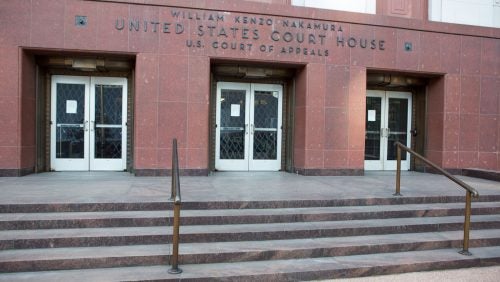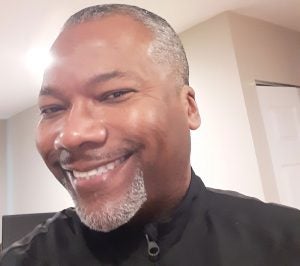Georgetown Law Clinic Students Use Legal Skills for Good in a Time of Heightened Need
April 28, 2020

Courthouses nationwide have closed due to the COVID-19 pandemic, including the the U.S. Court of Appeals building in Seattle, Washington.
Many courtrooms have shut their doors or suspended activities amid the coronavirus pandemic. But that hasn’t kept Georgetown Law’s clinical program from achieving its mission to teach the practical art of lawyering while serving underrepresented communities. Indeed, the program continues to serve the common good – in new and innovative ways – at a time of intense need.
Take the school’s Criminal Justice and Criminal Defense & Prisoner Advocacy clinics. Soon after the Law Center shifted to distance learning last month, clinic students and faculty learned that more than 100 inmates in a D.C. jail were still serving out sentences for misdemeanor offenses despite grave health risks to themselves and the rest of the prison population.
Confined to small cells with beds spaced three feet apart, inmates were unable to follow the government’s social distancing guidelines and had little access to hygiene products like soap and hand sanitizer. What’s more, some had underlying health conditions like asthma and diabetes – and were at especially high risk of contracting or dying from the virus, which was spreading in the D.C. prison system.
“It was not only a humanitarian crisis but also a public health crisis,” said Associate Professor Vida Johnson, who helps lead both clinics.
She and her students and fellows immediately put their legal skills to work. They obtained a list of people serving sentences for misdemeanors like shoplifting, trespassing, and failure to appear in court, and began taking steps to secure their early release. They reached out to assigned attorneys and asked permission to file motions to reduce sentences. And they studied each case to find out inmates’ health status and other relevant information.
Exciting and humbling work
Veena Bansal (L‘20) was one of the students who volunteered to take on a case. “I thought it was a perfect opportunity to help people and to also get some really great litigation experience,” she said. So, in addition to completing her regular coursework this spring, she filed a motion with help from her supervisor on behalf of a homeless man who was about halfway through a four-month sentence for stealing packages off of people’s porches.
The most challenging part, she said, was getting information about a man she had never met from a legal system that had largely shut down. But her motion was granted – over opposition from the U.S. Attorney’s Office. “It was really exciting,” Bansal said. “But it was really humbling, too … to do this for someone, especially during this time and under these conditions.”
Within two weeks, other clinic students and fellows had secured immediate release for 14 more clients – three of whom they had worked with before the school shifted to distance learning and 11 of whom they had not. “One of the things that was so remarkable was that students and fellows were willing to go to bat for clients they had never met before,” Johnson said.
Students launch domestic violence helpline
Protecting incarcerated people’s health is just one of the many ways that the clinical program – the largest and most highly regarded in the country – continues to serve even as classes and advocacy have moved online. “All are continuing to do important work at a time when our clients’ needs are even more heightened,” said Patrick Griffith, assistant dean for clinical programs.
In the Domestic Violence clinic, for example, students and faculty have found an innovative way to help survivors, who are potentially at higher risk for abuse under stay-at-home orders. Faculty teamed up with domestic violence clinics at DC-area universities to launch a “helpline,” where students help survivors file complaints online and create and preserve evidence.
The work serves a great need, according to the clinic’s director, Professor Deborah Epstein. Nine in 10 people who file complaints for protective orders lack legal representation, and many have difficulty navigating an often complex legal system, she said. “If you draft your complaint in a way that doesn’t have legal merit, and you’re not a lawyer, your case will ultimately be dismissed.”

Charles Hall
Another example of a Georgetown clinic doing great work amid the pandemic: Professor Erica Hashimoto and students Claire Gianotti (L‘20) and Samuel Kleinman (L‘20) and fellow Marcella Coburn recently secured early release of Charles Hall, a client of the school’s Appellate Litigation Clinic. To do so, they filed a memorandum waiving his right to be physically present in the courtroom and arguing that he should be sentenced to the time he had already served.
“Keeping [him] in prison longer than necessary could cause [him] irreparable harm,” they wrote. The judge agreed. Instead of postponing the client’s resentencing hearing until May, she held a videoconference in March, after which she sentenced the man to time served and three years of supervised release – a decision that made headlines in the National Law Journal. He was released and back home the following day and, at Hashimoto’s invitation, made a surprise visit to her final class this year.
Helping the vulnerable survive
Many other clinics are also serving people in need. The Juvenile Justice Clinic and Initiative is working with its partners in the Youth Justice Project to help protect detained youth from the dangers COVID-19 poses while they remain in detention centers and other supervised group settings, as well as coordinating community support by inviting wish list donations to incarcerated youth. Clinic students, staff, and faculty have also developed an online resource center for youth, their families, and their attorneys that lists dozens of organizations providing services and resources, such as food assistance, internet access, and educational support.
Law and medical students in the Health Justice Alliance Clinic, meanwhile, are helping children and families in poverty survive. Law students are using their legal know-how to help families avoid eviction; access food, health, and educational benefits and support; and address unsafe housing conditions that exacerbate asthma and other chronic health problems.
The clinic’s law students are also training medical partners in poverty law and developing “know-your-rights” informational materials for patients and families. And they’re working with medical partners to educate policymakers about gaps in medication coverage, food assistance, affordable housing, and other systemic problems that exacerbate health inequality.
The Social Enterprise and Nonprofit Law Clinic is collaborating with an economic development clinic at an area law school to provide legal assistance to small businesses and nonprofit organizations. The clinics have also launched a website that details COVID-19 response funding programs and are developing a series of workshops to help small businesses and nonprofit organizations navigate legal issues during the pandemic.
Applying “what we’ve learned”
When Georgetown announced the move to virtual learning, students in the International Women’s Human Rights Clinic, were actually on a fact-finding mission in Malawi. They not only made it home safely, they are now completing two human rights reports defending women’s reproductive rights and children’s rights to be free from sexual abuse in Malawi. Last week, the students presented their legislative proposals over Zoom, inviting Malawian partners and stakeholders and supporters from around the world.
“They really made the best of a very difficult situation,” said Professor Susan Deller Ross. “By presenting virtually, they were able to greatly enlarge their platform on which to push for women’s human rights.”
Meanwhile, the Appellate Courts Immersion Clinic is prepping to have Kalen Pruss (L’21) argue a false arrest case in the U.S. Court of Appeals for the Second Circuit via phone on May 1, while other students are on track to finish multiple briefs on behalf of a student with a disability denied a public education that meets his special needs (Tenth Circuit), a firefighter alleging race discrimination in his employment (Fourth Circuit), a prisoner denied religious meals in violation of the First Amendment (Ninth Circuit), and arguing that the federal government is unlawfully seeking to deport a legal U.S. resident (Third Circuit).
Such work – for real-life clients and in the public interest – has helped students like Grace Paras (L‘20) carry out their education and service work at a time of chaos and uncertainty. It “has been really motivating during a time when it could be hard to focus on schoolwork,” she said. “The clinic has done a better job than I could ever expect in making sure we’re focused on our work and that we maintain the collegiality that we normally feel in the office.”
Madeline Bardi (L‘20), a Domestic Violence Clinic student who fielded one of the survivor helpline’s first calls, agreed. “I’m glad we can use the skills that we’ve developed over the course of this semester to help in some way right now,” she said. “Georgetown really does emphasize the importance of using legal skills for good. It’s nice to be able to apply what we’ve learned.”